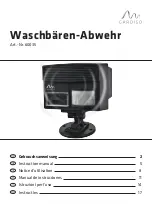
VMA410
V. 01 – 08/03/2017
3
©Velleman nv
4.
What is Arduino
®
Arduino
®
is an open-source prototyping platform based in easy-to-use hardware and software. Arduino
®
boards
are able to read inputs – light-on sensor, a finger on a button or a Twitter message – and turn it into an output
– activating of a motor, turning on an LED, publishing something online. You can tell your board what to do by
sending a set of instructions to the microcontroller on the board. To do so, you use the Arduino programming
language (based on Wiring) and the Arduino
®
software IDE (based on Processing).
5.
Overview
This module allows to use 3.3 V sensors on a 5 V microcontroller.
low side (3.3 V) .................................................................................. 2 inputs and 2 outputs
high side (5 V) ................................................................................... 2 inputs and 2 outputs
other connections ............................................ V low (3.3 V), V high (5 V) , pass-through GND
dimensions ............................................................................................... 15 x 16 x 15 mm
The VMA410 LLC is very easy-to-use. The twelve pins – six on each side – can be divided into groups of three.
The middle section of the board serves the high and low voltages. Supplying voltage to all four of these pins is
required.
Example: To convert 3.3 V into 5 V, run the 5 V into the HV side and 3.3 V into the LV side. Also, make sure
each is grounded.
The outer pins serve as inputs and outputs for channels 1 and 2. Each channel has one voltage divider and one
MOSFET shifter.
RXI
High-voltage input to voltage divider from the high-voltage device. The signal will be shifted down
and sent to the low-voltage device on the RXO pin.
RXO
Low-voltage input from voltage divider to the low-voltage device. The signal will be shifted down
from the RXI input.
TXI
Low-voltage input/output of the MOSFET circuit. This pin interacts with the TXO on the high side.
Bi-directional, but the only shifter that will shift from low to high.
TXO
High-voltage input/output of the MOSFET circuit. This pin interacts with the TXI on the low side.
Bi-directional, but the only shifter that will shift from low to high.























